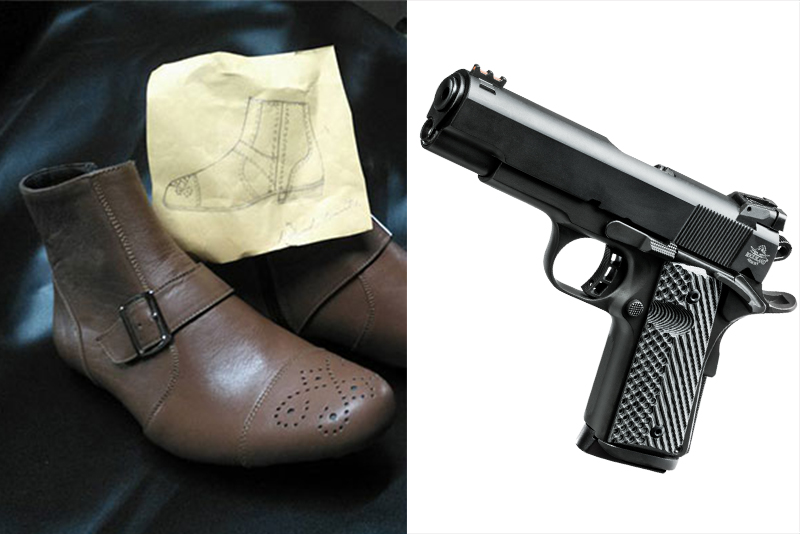Marikina posing to become Philippines’ firearms capital

Left: Marikina shoes given as a gift by a local shoemaker to President Rodrigo Duterte Philstar.com/File
Right: A Marikina-made TCM pistol similar to what the president allegedly owns. Armscor/File
MANILA, Philippines — Due to the recent Marawi crisis and terror threats in Metro Manila malls, more and more civilians plan to bear arms to protect themselves and their families, a defense expert claims.
In the Philippines, there are less than .9 police officer per 1,000 people in the population, a dismal number if compared to neighboring countries like Thailand, where there are 2.7 policemen per 1,000 people, says Apa Ongpin, communications consultant for global arms and ammunition company Armscor Global Defense.
The Philippines’ lack in policemen and national crime database makes the country vulnerable to terror attacks, more so now that the country needs more security to protect its growing economy, Ongpin says.
“Since there is not enough police and credibility for the police, some people would rather fix situations on their own than have the police there,” adds Armscor President Martin Tuason.
Many times, firearms are misinterpreted as bad, but it is not really true, Tuason says.
“Our president (Rodrigo Duterte) is pro-firearms as you know sometimes, that is why people are afraid of him. But, as they say in Davao, 'It's better to have a gun and never have to use it, than need it and not have it’,” he says, which is why, for him, defense through owning or learning how to handle firearms is the way to go for Filipinos.
“In the US, as long as you have an ID, you can have a gun in a maximum of two weeks’ time,” he notes.
He acknowledges that it has been getting harder to own firearms for self-defense in the Philippines, which is why Armscor has organized the First Tactical and Survival (TACS) Expo on June 1 to 4 at the SM Megatrade Halls 1 to 3 in Mandaluyong City.
The expo, Ongpin says, aims to educate civilians on the pros and cons of owning a gun and would serve as a one-stop shop for gun ownership, making it easier and faster to get a license than applying in Camp Crame.
The exhibition will also showcase lectures on how to get a license to own firearms, as well as introduce the Philippine National Police’s new online program that would make license renewal more efficient.
“You can have license to possess firearms even if you don’t have firearms,” assures Armscor Senior Vice President and Deputy Chief Executive Officer Gina Marie Angangco.
“Acceptance of guns is not a problem in the Philippines,” Ongpin declares. “We're even probably gun-crazy like the US. But we really have to build up our security forces on our own before we can empower civilians with guns.”
Marikina: Guns n’ shoes
In the expo, the PNP and the Armed Forces of the Philippines will set up booths that will enable them to interact with civilians to inform them on how government moves to protect them.
Ongpin says that it is unfortunate that “our armed forces and police are totally reliant on imported stuff.”
“Most of our weaponry is reliant on US, but what happens now that we have different relations with US?” he maintains.
Colonial mentality, according to him, makes the Philippine government procurement biased to more expensive goods, which should not be the case because unknown to many, the Philippines can manufacture its own weapons and build an arsenal big enough to protect itself.
Tuason says that while the government has its own factory engaged in small-scale firearm production, Armscor is the Philippines’ biggest, and by far, only ammunition manufacturer that can make 10,000 guns in a month, Angangco adds.
She shares that there are reports that the government will shell out around P600 million for 90,000 pistols, but the government can save a lot if it is to patronize locally-made firearms. Even grenades can be locally produced, she says.
“If our arms are locally made, these can match our soldiers’ capacity, and we have a home country advantage,” she claims.
The Philippine Army’s recent win in a shooting competition in Australia and Team Philippines’ 70-medal victory, 20 of which are gold, in the ASEAN arms meet last November prove how well local soldiers can fare using Filipino-made guns, Angangco points out.
She says that Armscor is the first to have an ammunition battalion or reservist group that is on-call for the nation’s service.
Before establishing Armscor, Tuason’s family was into a shoe manufacturing business in Marikina, one of Shoe Mart’s early competitors, he says.
In the ‘60s, Tuason’s family began making guns. From 22 guns, the business has grown into a large-scale factory in Marikina, shipping ammunition to Japan, Unites States and the like.
The Armscor factory has become a tourist destination with its own shooting gallery and festival, Tuason says. This, he says, makes Marikina not only the country’s shoe capital, but a must-visit for weapons enthusiasts.
Unfortunately, in the Philippines, Armscor’s biggest competitors are illegal manufacturers. The Japanese Yakuza is the main market for illegal manufacturers, Angangco reveals.
Through the expo, she hopes more citizens would appreciate government’s “Filipino first” campaign and take their cue from their leaders, such as Duterte and past presidents Benigno Aquino III and Joseph Ejercito Estrada, who are all using Filipino-made ammunition.
Angangco takes note that Duterte is as proud of his Marikina gun in as much as he is fond of his Marikina shoes.



















